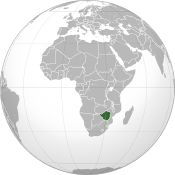Zimbabwe opposition agrees to join government
Friday, January 30, 2009


Image: Jeremy Lock.
Morgan Tsvangirai's Movement for Democratic Change (MDC) has agreed to join a government of national unity in Zimbabwe. Robert Mugabe will remain as president, while Tsvangirai is set to be sworn in as prime minister on February 11.
Despite the agreement, Tsvangirai and other MDC members expressed disappointment over the terms of the unity government. "We are not saying that this is a solution to the Zimbabwe crisis," Tsvangirai told reporters. "Instead, our participation signifies that we have chosen to continue the struggle for a democratic Zimbabwe in a new arena."
Among the MDC's concerns is the home affairs ministry, which oversees the police and security forces. Under the power sharing agreement, Mugabe and Tsvangirai will share control of this ministry, and the MDC says Mugabe could use that power to quell dissent as he had in the past.
Tsvangirai signed the agreement to take part in a unity government at a Southern African Development Community (SADC) summit in Pretoria, South Africa. Opposition leaders had been pressing Mugabe to relinquish control of the home affairs ministry and release imprisoned political activists as part of the power sharing deal. But Tsvangirai's party said they were pressured into accepting the deal by the SADC, who refused to condemn Mugabe.
Kenyan Prime Minister Raila Odinga called on the SADC to stop "treating Mugabe with kid gloves" at the World Economic Forum in Davos, Switzerland. "We hold the view that SADC could do more in trying to help the people of Zimbabwe resolve the crisis," said Odinga. "SADC should stand up and tell Mr. Mugabe enough is enough. It is time for him to leave."
Meanwhile, Western countries such as the United States remained skeptical regarding the prospect of true power sharing. U.S. State Department spokesman Robert Wood told reporters in Washington, "If and when there is a government in place in Zimbabwe that reflects the will of the Zimbabwean people, the United States will then look to see what we can do to continue to help."
Mugabe claimed victory in a runoff election in June 2008 which was widely seen by the international community as flawed. Earlier in March, Tsvangirai had garnered more votes than Mugabe in the general election, but the electoral commission said the opposition candidate did not receive a required majority of the votes. Tsvangirai then dropped out of the June runoff, claiming his supporters had been attacked and intimidated by state officials.
Regional heads of government have been trying to negotiate a coalition government since the election. Neither side had been able to come to an agreement over the distribution of cabinet posts. Tsvangirai sought a constitutional amendment to recreate the post of Prime Minister, whilst Mugabe had wished to maintain his Zimbabwe African National Union – Patriotic Front (ZANU-PF) party's hold on the main offices of state.
In the past year, Zimbabwe's economy has gone into freefall, with inflation so high as to be effectively unmeasurable, and an outbreak of cholera that has resulted in over 60,000 cases reported and over 3,100 killed. 6.9 million people, more than half the country's population, is in need of emergency food aid, according to the United Nations.
Related news
- "Zanu-PF attempts to reassign Zimbabwean ministries, MDC angered" — Wikinews, October 12, 2008
Sources
- Donna Bryson. "Zimbabwe opposition will join unity government" — The Associated Press, January 30, 2009
- Celia W Dugger. "Zimbabwe Opposition to Join Government" — The New York Times, January 30, 2009
- "Zimbabwe opposition says it's ready for unity government" — CNN, January 30, 2009
- Brian Latham and Nick Salter. "Zimbabwe’s Tsvangirai Will Join Coalition Government" — Bloomberg, L.P., January 30, 2009
- Karin Brulliard. "Zimbabwe Opposition Will Join Unity Government" — Washington Post, January 30, 2009

